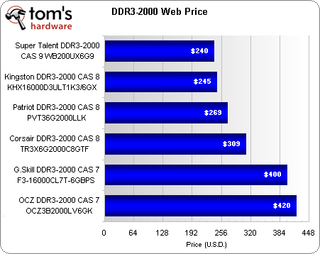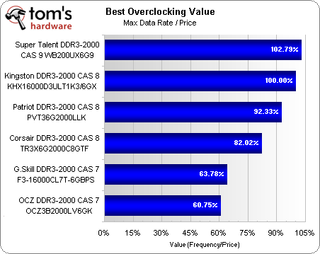Life At 2 GT/s: 6 GB DDR3-2000 Memory Kits Compared
Pricing, Value, And The Wrap-Up
Putting the price difference in a bar graph makes it easier to visualize.

The most expensive modules in today’s DDR3-2000 6 GB memory kit comparison cost around 80% more than the cheapest (Ed.: the Super Talent modules can now be found as low as $215 on the morning after publication), yet all products achieved similar timings. The difference in overclocking capability was more pronounced however, and that sets us up for a comparison of overclocking value. This comparison’s slowest memory sets the baseline.

Though second-from-last in overclocking capability, ultra-low-pricing makes Super Talent’s CAS-9 rated DDR3-2000 a top value. Adding excellent low-latency capability at various speeds, it would probably qualify as a winner, if only availability were better.
Second-place value Kingston HyperX DDR3-2000 CAS 8 came in dead-last in overclocking at DDR3-2030, yet once again we see the impact of an ultra-low price. Availability of these is fairly good, so performance enthusiasts on moderate budgets should be pleased.
Patriot’s Viper memory fell in the middle of most tests, yet the brand did stand out with lowest-stable DDR3-2000 timings of 7-7-6-18. Its price also comes in around the middle, making it a mid-range value.
Second-place overclocker Corsair Dominator GT falls to fourth in value, but fans will note that it’s the most affordable kit to reach DDR3-2100.
Anyone who wants to go only 14 MHz faster will pay dearly, as the top two memory kits have the hardest-to-justify value. G.Skill edges out OCZ by reaching the same clock speed at a lower price, making it a good choice for anyone who wants the fastest parts available.
Stay on the Cutting Edge
Join the experts who read Tom's Hardware for the inside track on enthusiast PC tech news — and have for over 25 years. We'll send breaking news and in-depth reviews of CPUs, GPUs, AI, maker hardware and more straight to your inbox.
Note that none of today’s modules hit DDR3-2133, yet several brands are now advertising this speed. Unfortunately, getting there typically requires setting fairly lofty voltage levels, such as a CPU Uncore of 1.75 V, and we simply didn’t want to risk damaging the CPU before testing could be completed. These types of requirements cast doubt in our minds about the practical capabilities of currently-advertised faster-rated parts, and we have no reason to believe available DDR3-2133 modules are quantifiably better than the fastest DDR3-2000 sets in today’s test.
Current page: Pricing, Value, And The Wrap-Up
Prev Page Test Results: Overclocking, Latency And Bandwidth-
philologos Can I make a suggestion? I would like to see a trial, in which the i7's integrated memory controller is overvolted incrementally to death.Reply
Much has been made since the inception of Nehalem about the offical "safe" vDimm limit of 1.65v. There have been no lack of intrepid overclockers who've pushed this spec to 1.7, even 1.75 volts. I want to see the actual limitation demonstrated in spectacular fashion with pictures. Also, I highly suspect memory voltage on the X58 platform is capable of increasing the CPU heat output; it would be satisfying to see confirmation of this. Give this idea some thought. -
dragonsprayer Hey guys, THG is the best! People you need free tech support THG is #1! The article is nice, I wish we had a big comparison to really show - 3 cpu's, different rans....well anyways!!! Good info as always, fact is you do get significant ranges of mem bandwidth at the same settings. You can take different types of ram , set them at the same settings all 100% stable and yes huge swings in membandidth.Reply
Yes, in in many cases high end ram give slight increases, those ranges of 10-15% are common for bandwidth. Yet the i7 system is so advanced and so far a head of software, the software rarely knows the difference or the results i should say.
WSZ says: Skip 2000 ram, go for 1600 ram, a 920 at 1500-1700 fsb is untouchable for the pricer to performance provided. THG has show muskin 7-7-7 or slightly higher latecy ram to really blow everyone away.
We live in the best times, for the advancement of computer parts, we an not shirink for ever!!! We are at 32nm? Then what 3 atoms thickness?
Yes, AMD really has a good system now with the south bridge 750 oc, but nobody cares - i mean my customers. 7-8-7-20 at 1.65v at 1550 to 1650 is the sweet spot if you can squeeze it out - you may just go with 8-8-8-24 with 6GB of $100 ram. Sweet spot on the 20 multipier is 3.8ghz air cooled. We getting 4.4ghz with water - i toss a photo in for fun - this is mid level system with minmual rads but runs 70-75c at 4.3ghz all day with quad sli: http://s329.photobucket.com/albums/l373/warpedsystems/?action=view¤t=WSZ-WCcm-T31.jpg -
dragonsprayer philologos -- does not help at all, in fact it just makes the system unstable, skip the stroy why we set thte QPI to 1.65v instead of 1.33v as was to be done. The reuslts:Reply
system was find, after 3 weeks starting have issues - crashes
bottom line is do not to it - 1.33-1.35v is fine for most QPI
-
doomtomb 1600MHz DDR3 still provides the best price/performance. Not just that, but there is about 0.5% real world performance gain from higher clocked memory.Reply -
dragonsprayer exactly doomtombReply
in fact this has not change for 3 years
around 1600-1700 is the sweet spot, in highend and exact system, make just one lateny setting lower - we are build 3 systems. one, is a $4000 air cooled system, one is a $5000 water cooled and one is a $6000+ water - these are not gaming sytems.
Getting the fsb is right is the most important thing in building a system, while i can it fsb in a i7 - it still the memory bus evern if its not fsb or front side bus
2-2-2-5 ram for ddr400 ddr
3-3-4-8 ram in ddr800 ddr2
7-7-7-20 with ddr3
-
Crashman philologosCan I make a suggestion? I would like to see a trial, in which the i7's integrated memory controller is overvolted incrementally to death.Much has been made since the inception of Nehalem about the offical "safe" vDimm limit of 1.65v. There have been no lack of intrepid overclockers who've pushed this spec to 1.7, even 1.75 volts. I want to see the actual limitation demonstrated in spectacular fashion with pictures. Also, I highly suspect memory voltage on the X58 platform is capable of increasing the CPU heat output; it would be satisfying to see confirmation of this. Give this idea some thought.Reply
Unfortunately that's impossible. They don't die instantly, they die over a matter of weeks. Intel published a bunch of data on how long the memory controller last at various voltage levels, we're talking several weeks at 1.70v and at least a few days at 1.75v.
So, when the memory controller finally did die, nobody woul know whether the voltage or time was the most significant factor. -
Kill@dor Awesome review Thomas. Thank you for making a great comparison... I still think Kingston's DDR3-2000 is the best value over all. Pushing the CPU past 1.7v core is not an option in my opinion, and anyone with good clocking skills can push a core i7 920+ to 4.0GHz @ 1.25v with this kind of RAM speed and bandwidth. I'm running an (1066 strap)E6600 @ 3.6GHz, 2:8 ratio and 20MB/s dual-channel throughput on DDR2-1200, the 8800GT Superclocked Version and it runs crysis like silk on 2ms 1920x1080p. Super Talent has shown better performance and value in this line and i'm glad to see it as well. This is the kind of performance i have been waiting for and its a great confirmation of what i have been suspecting about these RAM's. The only reason why i haven't changed the graphics is because Nvidia/ATI have not had a significant jump in hardware besides the 4870x2 and GTX295 (too expensive/too much power needed), but i know the good stuff is coming Q4. Time to build another 5yr build with a quad this time ^_^Reply -
sublifer Great review. At the pricing chart I was eyeing the Kingston with the low price and decent rated timings. I was surprised to see the cheapest kit, the Super Talent, to match up with the best in timings, that'd definitely be a great buy.Reply -
dragonsprayer Ya, check that supertalent review on newegg - oops thats me! we used that in many systems!Reply
if you want to pot for the extra bandwidth get muskin
corasir gave us 10%+ more bandwidth at the same settings a supertalent - then again it was double the price -
avatar_raq Nice article..But I thought it'll include real time programs and games benchmarks. Honestly, we all know the difference netween them is so small, that's negligible.Reply
Most Popular


